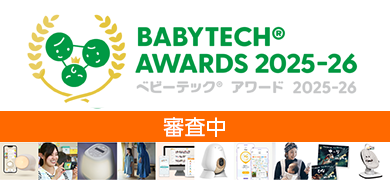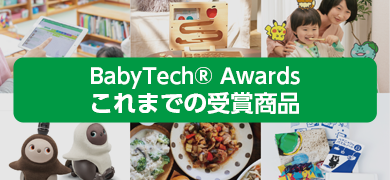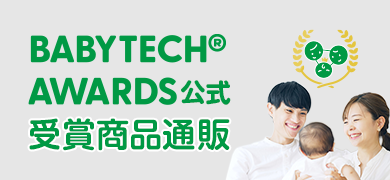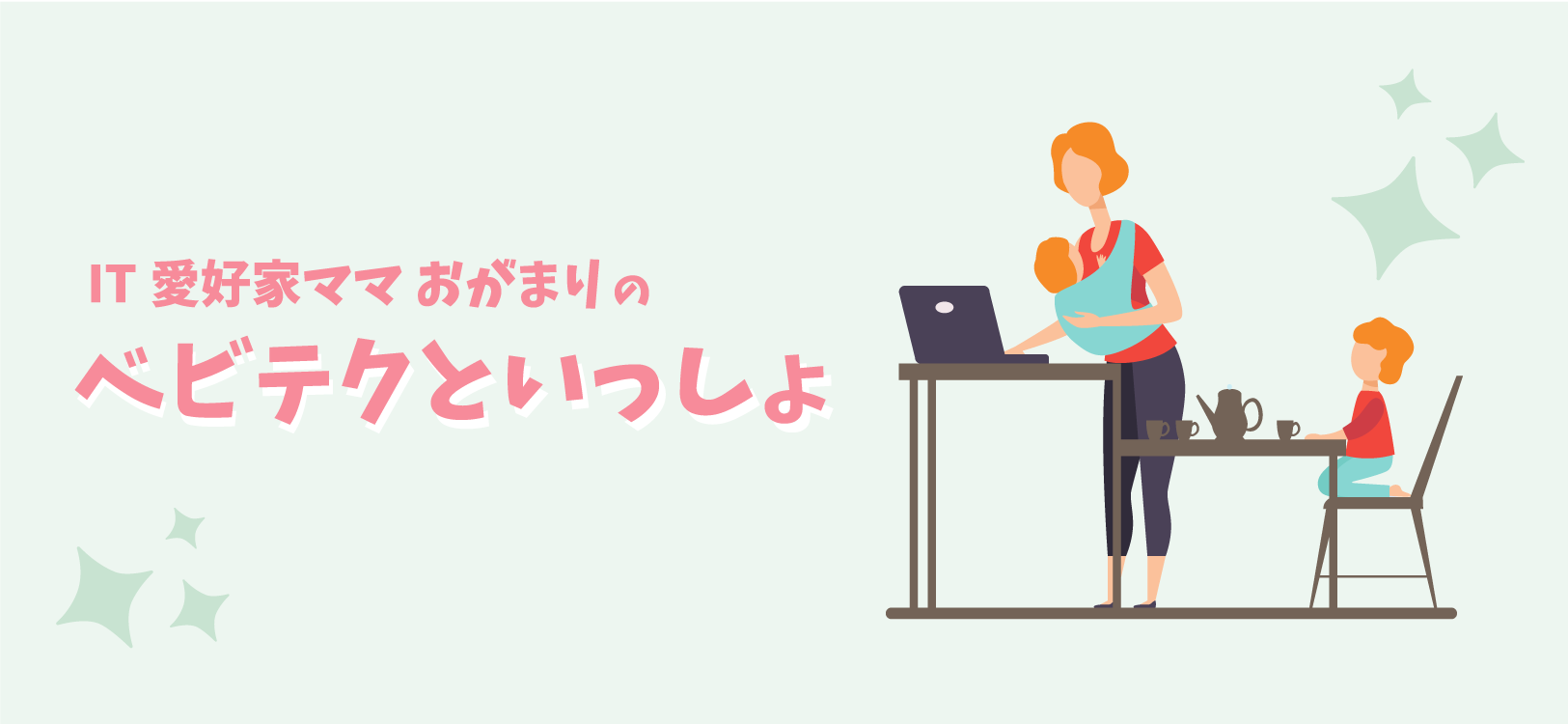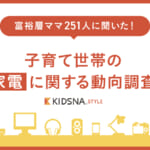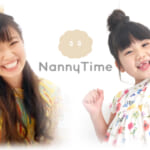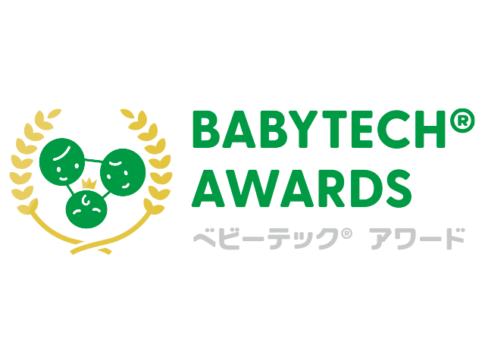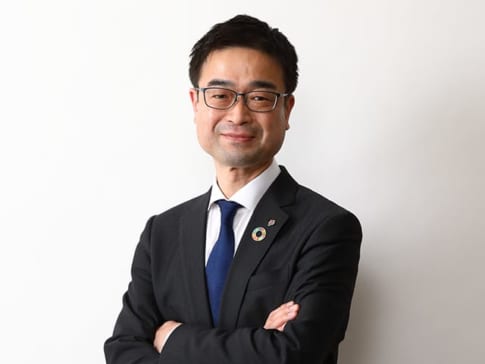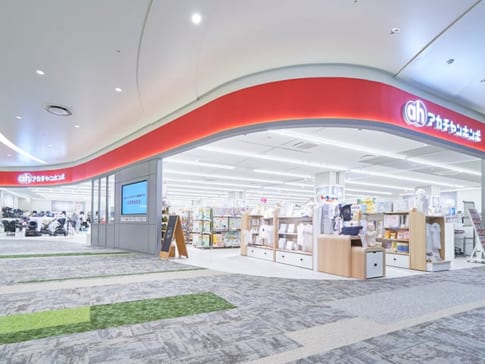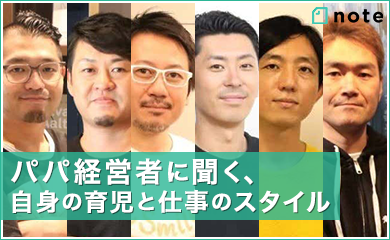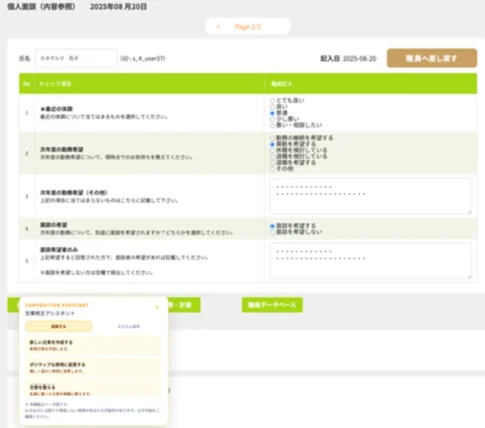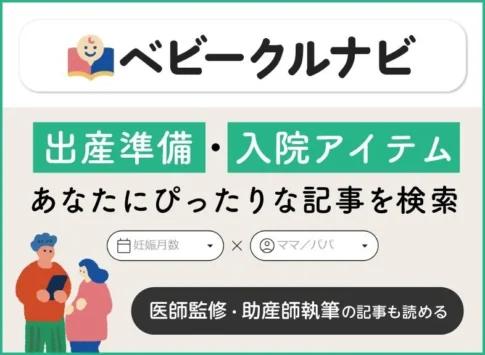Nearly half of Generation Z use "SNS" to gather information on child-rearing
~Enphoto conducted a survey on "Information Gathering on Child Rearing and Differences in Values with Parents' Generation" just before the year-end and New Year's return home season.
- The following is content from the press release -
(Chuo-ku, Tokyo; President: Tomoya Hoshi), a leading company in solving labor shortage issues and developing multiple SaaS services, conducted a "Enphoto" online photo sales service for preschools and kindergartens. The survey was conducted on information gathering regarding child-rearing and differences in values between parents and their generation.
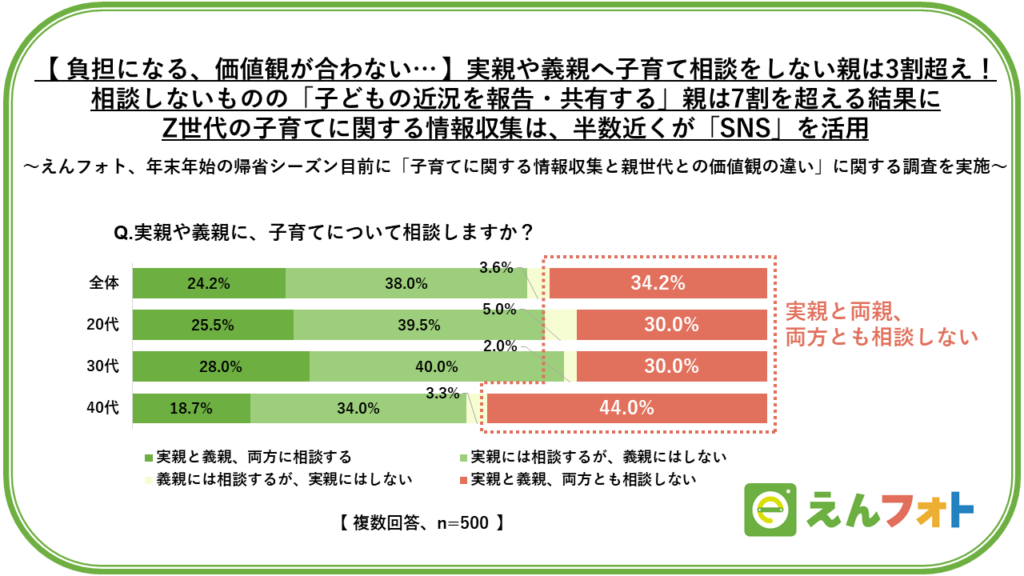
Survey Summary
- More than 30% (34.2%) of parents of preschoolers do not consult their own parents ("parents-in-law") or parents-in-law ("parents-in-law") about child-rearing. <The most common reason given was "Because it would be a burden on the other party" (30.01 TP7T), followed by "Because our values do not match" (29.81 TP7T) by 0.2 points. <Result 4
- Nearly half of those in their 20s (Generation Z) use "SNS" (46.3%) to gather information on child-rearing, while those in their 40s gather information from "friends" and "friends of parents" more frequently than those in their 20s and 30s. <Results 5
- More than 70% (72.8%) of those who do not consult either or both of their own parents or parents-in-law regarding child-rearing also "report/share updates on their children. <The most common method was "SNS" (36.91 TP7T), and nearly 30% (28.71 TP7T) used photo-sharing services. <Result 10
- On the other hand, the most common reason for not reporting or sharing updates on their children was "It's a hassle" (22.51 TP7T), followed by "I don't have a good relationship with my in-laws" (21.11 TP7T) and "They might think it's annoying" (19.31 TP7T). <Result 11.
Research Background
Common sense regarding pregnancy and child-rearing has changed dramatically as the times have changed from Showa to Heisei to 2022, and an increasing number of local governments have recently published "Handbooks for Raising Grandchildren" to address the concerns of those who feel that values regarding the "child-rearing generation" and the "grandparents generation" do not match. Therefore, Enphoto conducted a survey of parents who are raising preschool children to find out how they gather information on child-rearing and the actual situation regarding the differences in values between parents (the child-rearing generation) and their parents (the grandparents generation).
results (of a study)
Result 1
When asked whether they consult with their own parents or their parents-in-law about child-rearing, more than 30% of parents (34.21 TP7T) answered that they do not consult with both their own parents and their parents-in-law, exceeding those who do consult with both. By generation, the trend was found to be higher among those in their 40s, while those in their 20s and 30s each answered "consult with my own parents, but not with my in-laws" at nearly 40%.
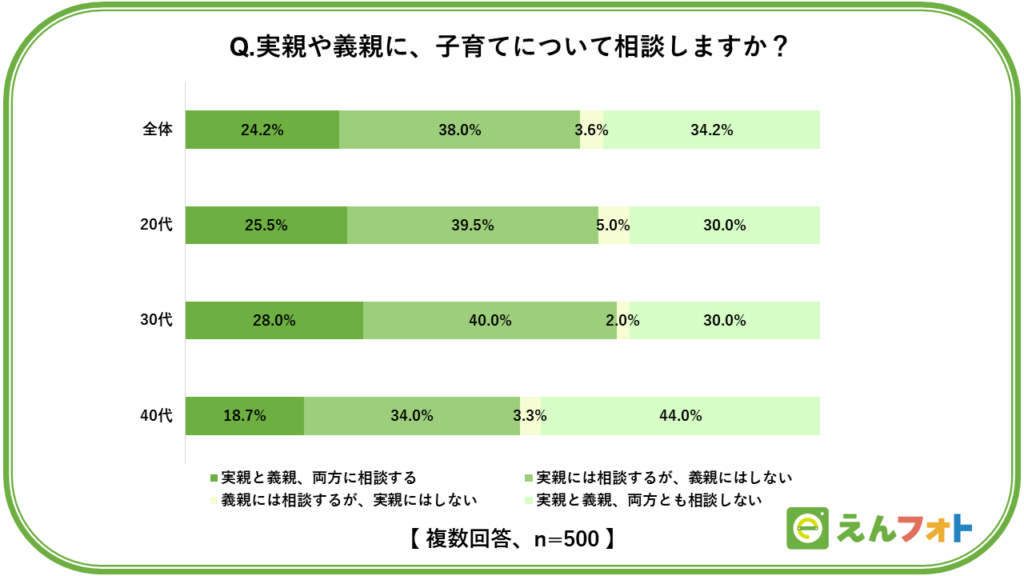
Result 2
When those who answered that they "consult with both or either my parents or my parents-in-law" about child-rearing were asked how often they do so, the highest percentage (27.1%) answered "about once a month.
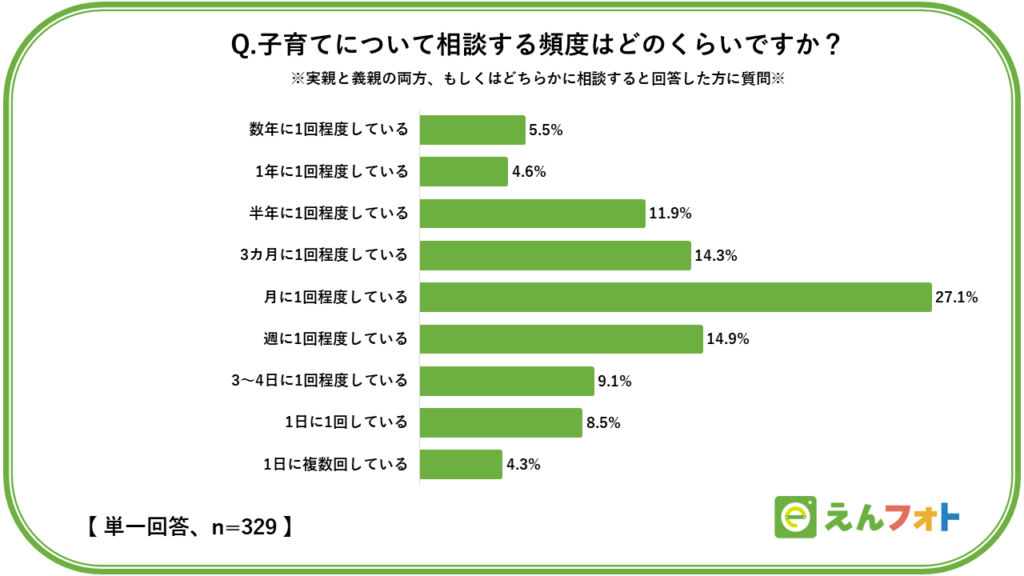
Result 3
When those who answered that they "consult with both or either my parents or my parents-in-law" about child-rearing were asked what kind of consultation they give, the highest percentage (69.6%) was "about my child's growth and health," at nearly 70%, followed by "about my child's education" (32.2%), "about my child's food (including baby food)" (23.4%), and "about my child's education" (23.4%). (69.6%), followed by "children's education" (32.2%) and "children's meals (including baby food)" (23.4%).
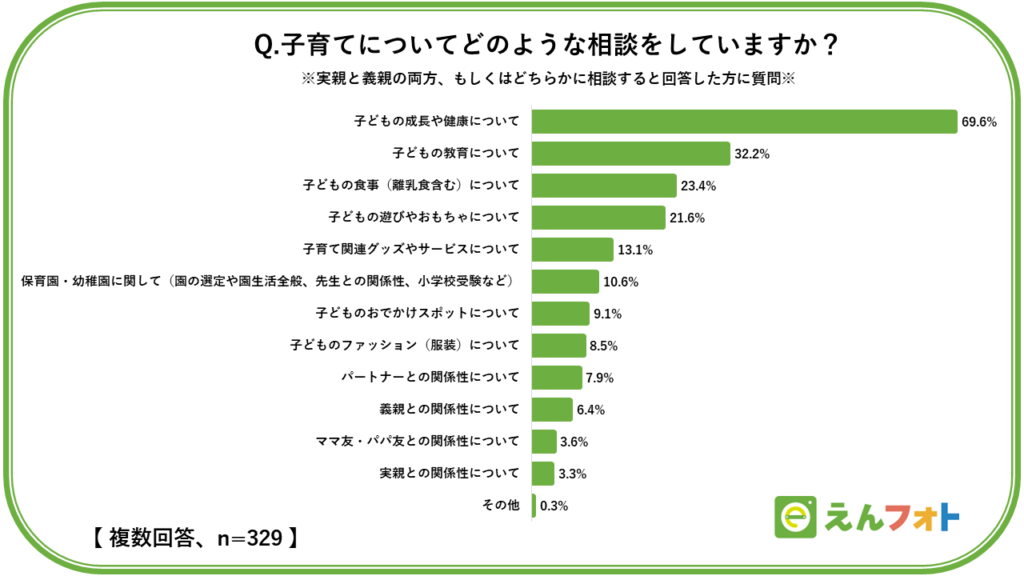
Result 4
When those who answered that they do not discuss child-rearing with either or both of their own parents and their parents-in-law were asked about the reasons for this, the highest response was "Because it would be a burden on the other party" (30.1%). The next highest response was "Because our values don't match" (29.8%) at about the same percentage, followed by "Because they interfere or interfere" (17.4%) and "Because I feel a generation cap" (13.5%).

Result 5
The most common method of gathering information on child-rearing among respondents who answered that they do not consult either or both of their own parents or in-laws was "Internet" (40.6%). This was followed by "SNS" (38.8%) by 1.8 points, and "friends" (33.0%) in third place.
By generation, nearly 50% (46.3%) of those in their 20s, the Generation Z, answered "SNS," while more than 50% (54.9%) of those in their 40s gathered parenting-related information through Internet searches rather than SNS, followed by "friends" (45.1%), friends of moms and dads ( (38.5%) and "SNS" (26.2%). It can be seen that there are differences in the way information is gathered by different generations.
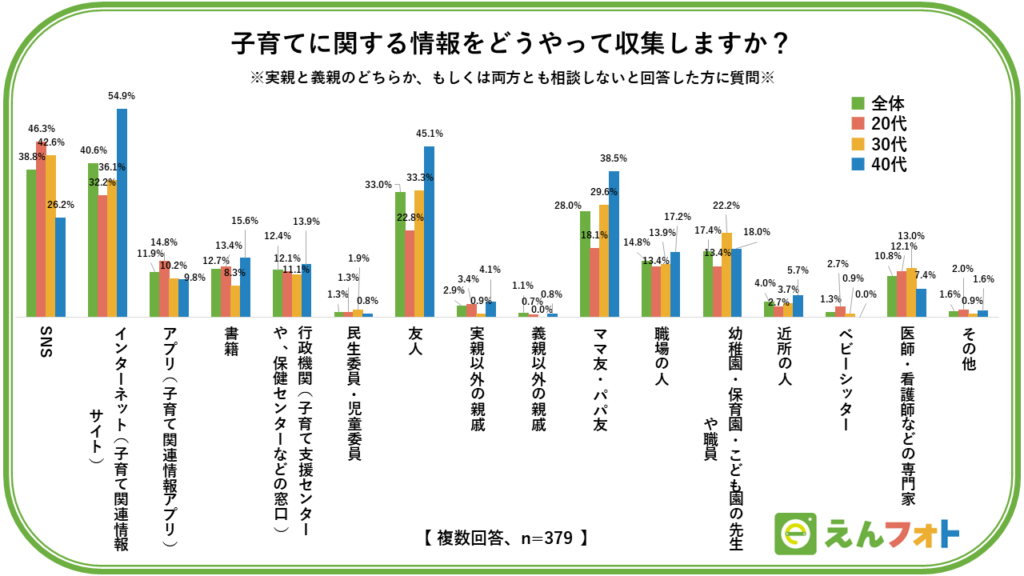
Result 6
When those who answered that they "do not consult either or both parents-in-law and parents-in-law" about child-rearing were asked what kind of information they collect from "SNS," "Internet," and friends, etc., the most common answer was "growth and health of children" at 53.61 TP7T, more than half of the respondents answered the same as in , and the largest number of respondents answered "I do not consult either or both parents-in-law and parents-in-law. The most common answer was "about my child's growth and health" at 53.61 TP7T, more than half of the total respondents.
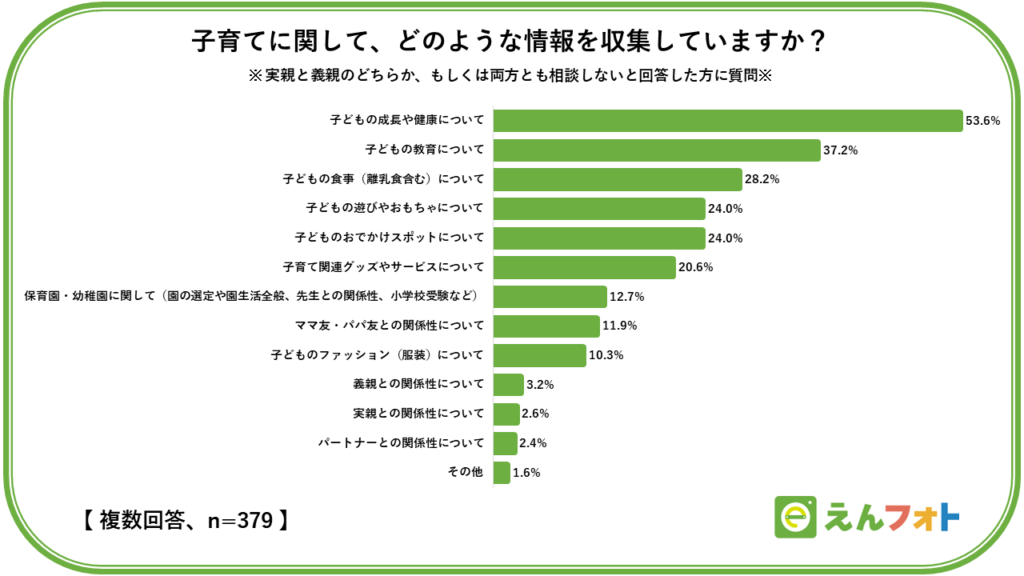
Result 7
Regarding whether they report or share their children's recent status with their own parents or step-parents regardless of whether they consult with them or not, 78.01 TP7T responded that they report or share with both or either of their own parents and step-parents. When we also examined the tendency of those who answered that they do not consult with either or both of their own parents and parents-in-law, more than 70% (72.81 TP7T) also answered that they report and share their children's recent situation to both or either of their own parents and parents-in-law.
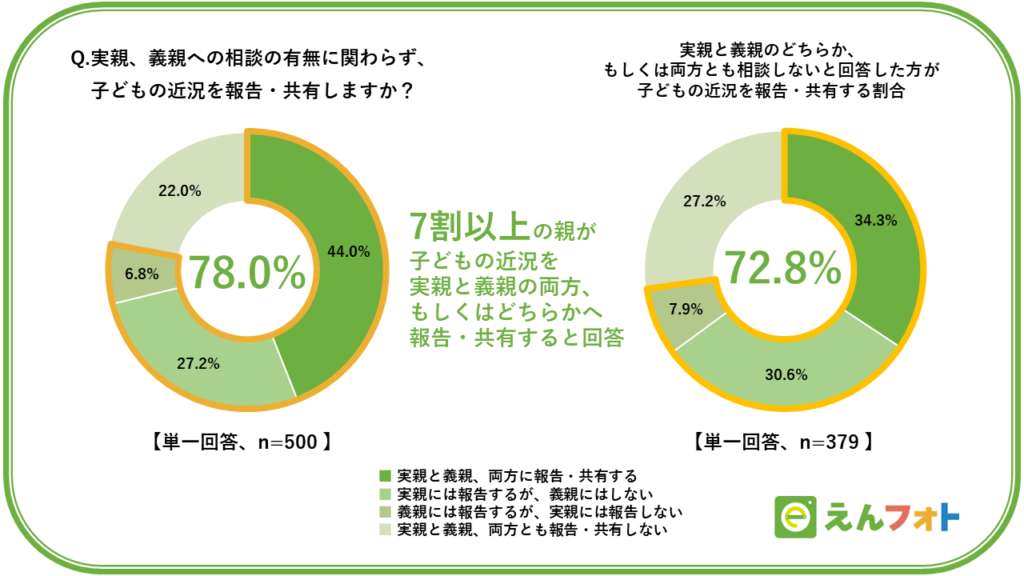
Result 8
When those who responded that they "report or share updates on their children with both or either my parents or my parents-in-law" were asked about the reason for doing so, the most common response was "to share my children's growth" (61.01 TP7T).
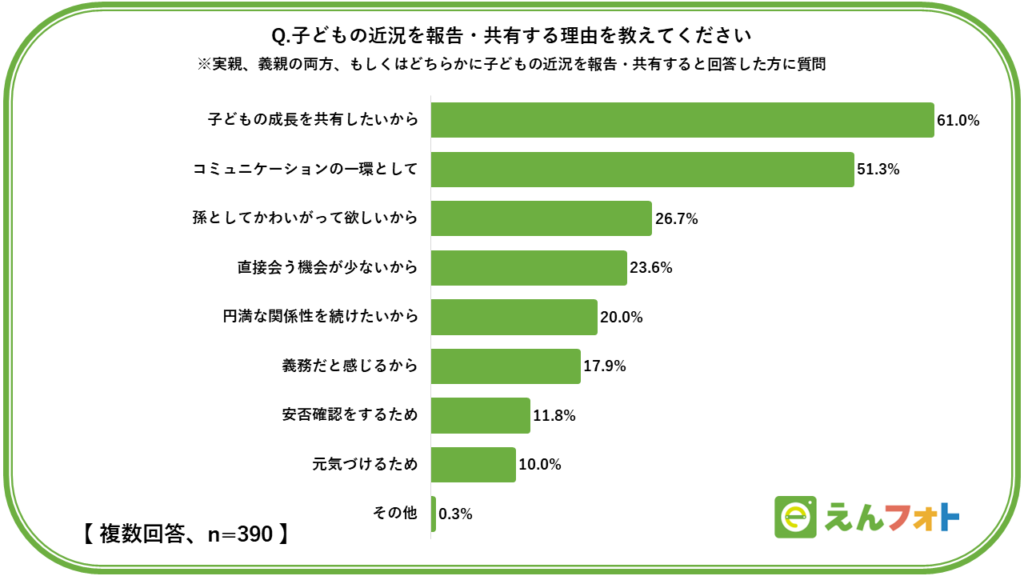
Result 9
When those who answered that they "report or share updates on their children with both or either their parents or parents-in-law" were asked about the frequency of doing so, the most common response was "about once a month" (33.31 TP7T).
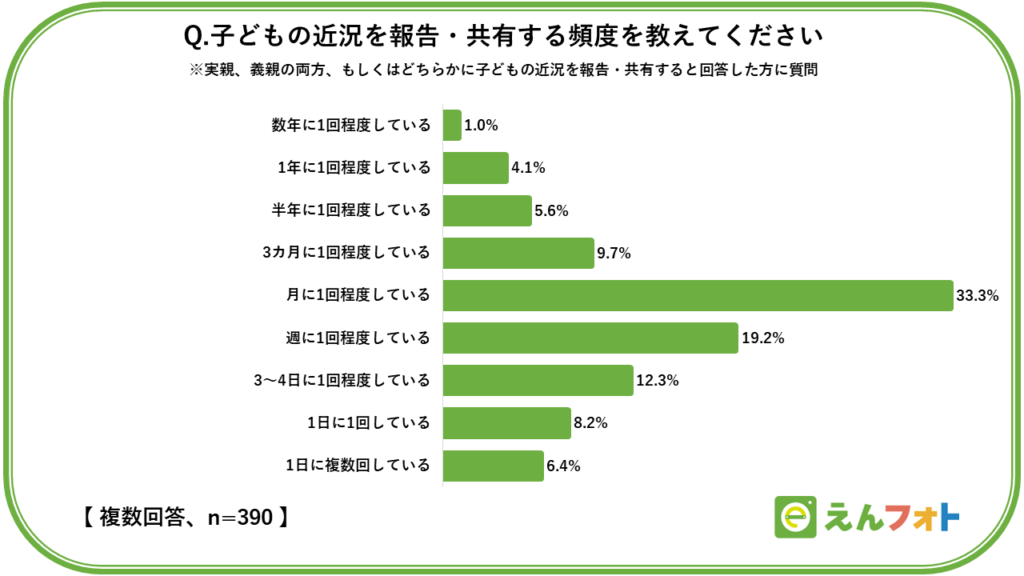
Result 10
When those who answered that they "report/share updates on their children with both or either their parents or parents-in-law" were asked how they do it, "SNS" (36.91 TP7T) was selected the most, followed by "going to see them during the New Year holidays and long vacations" (31.51 TP7T) and "photo sharing services" (28.7%). (31.5%).
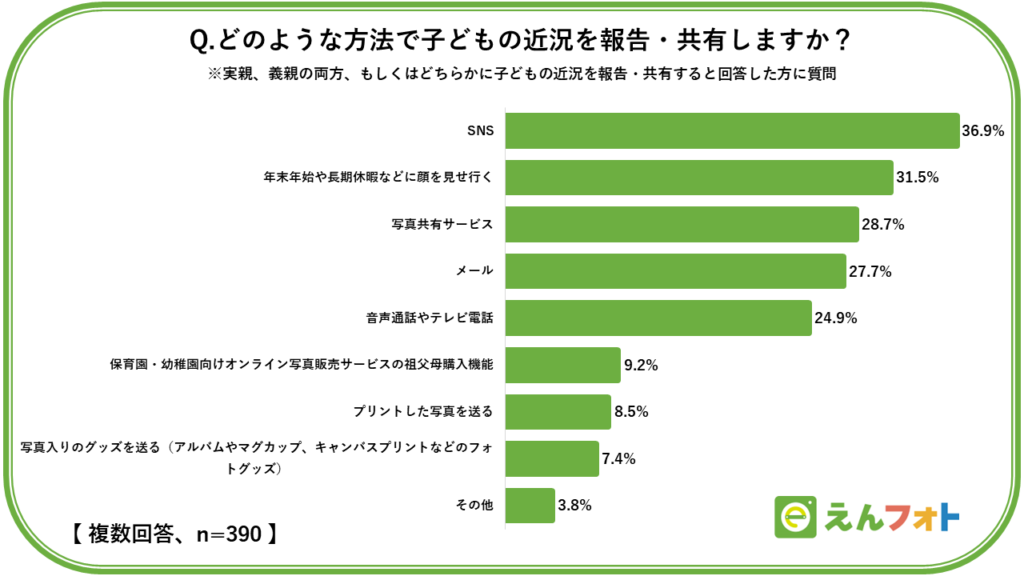
Result 11.
When those who answered that they "do not report or share updates on their children with either or both parents" were asked about the reason for not doing so, the most common response was "Because it is a bother" (22.5%). The most common reason given was "Because it would be considered annoying" (19.31%).
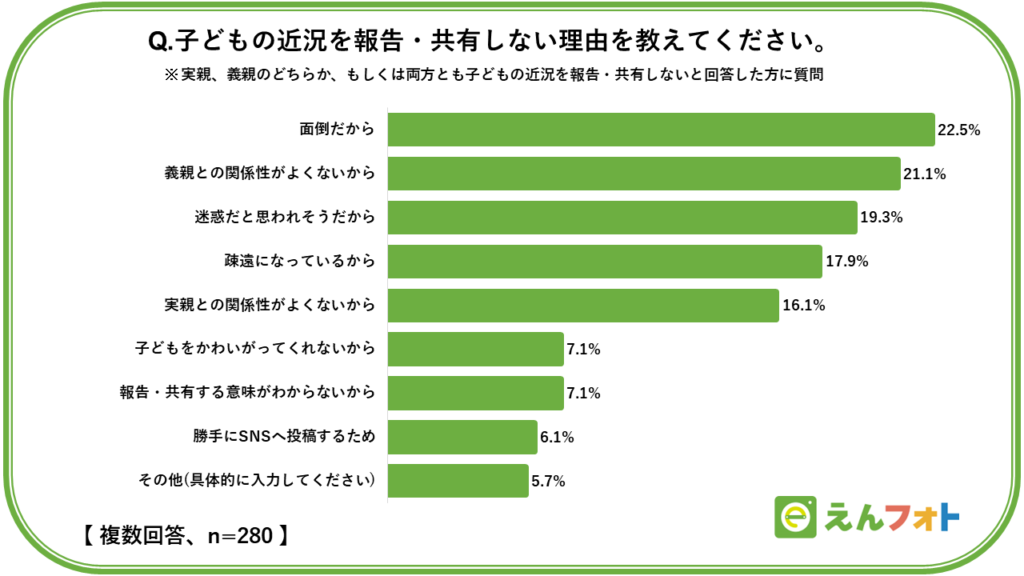
consideration
Executive Officer, in charge of Omoide Business Group, URURU Corporation

This survey has revealed the actual situation regarding the collection of information on child-rearing and the difference in values between the parents' generation and the children's generation.
When asked whether they consult their own parents or their parents-in-law regarding child-rearing, more than 30% of parents (34.21 TP7T) answered that they do not consult both their own parents and their parents-in-law, with the result exceeding 30% for each generation. In particular, those in their 40s showed the highest percentage of "do not consult with both parents-in-law and parents-in-law. While "I think it would be a burden on the other party" was given by 30% (30.11 TP7T) as a reason for not discussing the issue with their parents, "Because our values don't match" (29.81 TP7T) was also given by nearly 30% of the respondents.
In recent years, local governments and companies are issuing "handbooks on raising grandchildren" and "grandparent handbooks," as there are not a few cases of conflicting opinions on child-rearing due to the different common sense of the Showa and Heisei eras. In this survey, more than one in ten parents did not consult their own parents or parents-in-law about child-rearing because "they interfere or interfere" (17.41 TP7T), "I feel a generation gap" (13.51 TP7T), "I cannot sympathize with Showa-style thinking" (11.1%), and "they impose their parents' child-rearing theories" (10.41 TP7T). (10.0%), indicating the need for a guidebook to support grandparents in raising their grandchildren. As we approach the year-end and New Year holidays, many of you will be returning to your parents' or in-laws' homes, and we hope that you will refer to the aforementioned information provided by local governments and other organizations to help you communicate with your parents' generation.
Those who do not consult with either their parents or parents-in-law about child-rearing often use the "Internet" or "SNS" to gather information about child-rearing. In particular, one in two respondents in their 20s use "SNS," while among those in their 40s, "friends" (45.11 TP7T) and "friends of moms and dads" (38.51 TP7T) are more common than "SNS" (26.21 TP7T), following "Internet" (54.91 TP7T). This indicates that respondents are more likely to seek advice on child-rearing from real friends and acquaintances they are acquainted with, rather than from an unspecified number of people such as those on SNSs.
Finally, more than 70% (72.81 TP7T) of the respondents "do not consult either or both of their own parents or parents-in-law" regarding child-rearing, but "report or share updates on their children". Although there are differences in values regarding child-rearing between the Showa and Heisei eras, photos of children's growth and memories are still a bridge between parents (the child-rearing generation) and their children's parents (the grandparents' generation). However, despite the differences in values regarding child rearing between the Showa and Heisei eras, photographs of children's growth and memories may serve as a bridge between parents and grandparents.
Since sharing updates on one's children naturally leads to more discussions about child-rearing with one's own parents and parents-in-law, and may make it easier to receive support for child-rearing from parents-in-law, we felt that sharing photos and videos of one's children has the potential to support child-rearing. On the other hand, "Too much trouble" (22.5%) was the most common reason for not sharing updates on children, and we feel that we need to develop services that allow people to share photos and videos of their children more easily.
Survey Summary
- Name of the survey: Survey on information gathering on child rearing and differences in values with parents' generation
- Surveyed: Parents in their 20s to 40s with preschool children aged 0 to 6 years old
- Survey method: Internet survey
- Survey period: December 2 - December 3, 2023
- Sample size: 500 persons
Enphoto is an online photo sales service for preschools and kindergartens that has been introduced at more than 4,500 preschools nationwide and used by a cumulative total of approximately 270,000 parents (as of March 31, 2023). By capturing children's experiences, growth, and smiling faces, Photo has contributed to the creation of precious family memories.
We will continue to promote ICT in childcare to cherish children's memories and further expand our services to please all those involved in childcare.
What is Enphoto?
Bringing more happy memories to families around the world."
Enphoto is an online photo sales service for kindergartens, nursery schools, and parents, where "photo exhibition," "sales," "purchase, and payment" can all be completed on the web.
●Photos of the park can be selected and purchased on the web
The park uploads the photos taken and sends a simultaneous email to the parents notifying them of the photo release. Parents select photos on the web, place an order, and receive the photos within 5 business days. The preschool simply uploads the photos to the website, so there is no need to print or post them at all.
Find your child quickly! Face Recognition Function
The face recognition function allows parents to easily pick up photos of their own children. Authenticated photos can be displayed in priority order, eliminating the need to search for photos.
No need to worry if you don't have a photographer! Enphoto" also dispatches photographers to preschools.
URURU" also operates a crowdsourcing business called "Shufty. We arrange photographers who are crowdsourcers for preschools, so even preschools that do not have a photographer to hire can take cute pictures of children.
Overview of the Ururu Group
Ururu Corporation(in Japanese history)https://www.uluru.biz/)
Established: August 31, 2001
Location: KDX Harumi Building 9F, 3-12-1 Harumi, Chuo-ku, Tokyo
Representative: Tomoya Hoshi
Business Description:
CGS (Crowd Generated Service) business *CGS is URURU's unique business model that utilizes crowd workers.
Telephone answering service "fondeskhttps://www.fondesk.jp/
NJSS, a bidding information bulletin servicehttps://www2.njss.info/
nSearch*1"https://nsearch.jp/
En-Photo" photo sales system for kindergartens and nursery schoolshttps://en-photo.net/
OurPhoto*2, an on-site photography servicehttps://our-photo.co/
◆Crowdsourcing Business
Operation of the platform "Shufty https://app.shufti.jp/
◆BPO business *3
Comprehensive outsourcing "Ururu BPOhttps://www.uluru-bpo.jp/
Highly accurate AI-OCR service "eashttps://www.uluru-bpo.jp/eas/
Total support service for employment of persons with disabilities "eas nexthttps://lp.uluru-bpo.jp/easnext/
1 Operated by Brainfeed Inc.
2 Operated by OurPhoto Co.
3 Operated by Ururu BPO Inc.
For service inquiries, please contact
URURU Corporation Contact: Tanaka
TEL:03-6221-3064 E-Mail:t_tanaka@uluru.jp

